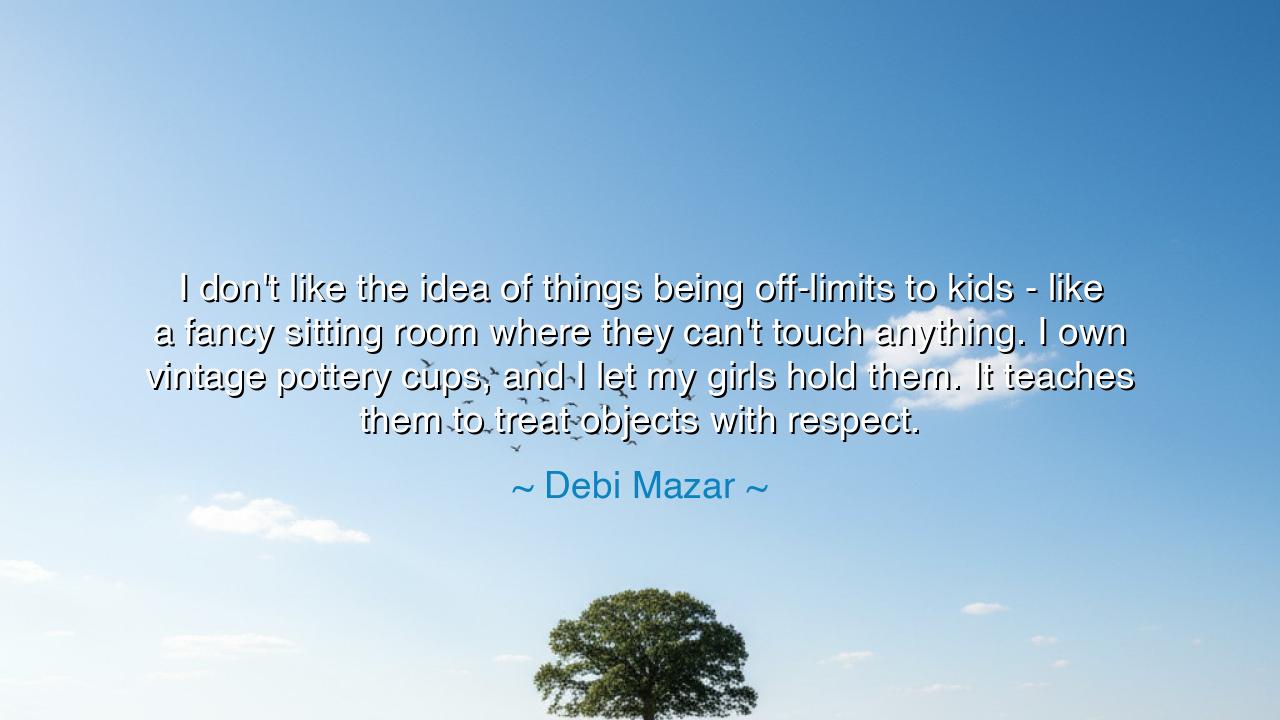
I don't like the idea of things being off-limits to kids - like a
I don't like the idea of things being off-limits to kids - like a fancy sitting room where they can't touch anything. I own vintage pottery cups, and I let my girls hold them. It teaches them to treat objects with respect.






When Debi Mazar declared, “I don't like the idea of things being off-limits to kids – like a fancy sitting room where they can't touch anything. I own vintage pottery cups, and I let my girls hold them. It teaches them to treat objects with respect,” she revealed a wisdom that reaches far beyond parenting. In her words lies the eternal truth that respect is not taught through fear or restriction, but through trust and responsibility. Her voice reminds us that dignity is learned not by keeping children away from the fragile and valuable, but by allowing them to hold such things with care, reverence, and accountability.
The first truth she names is the futility of off-limits living. A room where nothing may be touched is a shrine to fear rather than to beauty. Such a place teaches children not reverence, but distance—an idea that the valuable must remain foreign and forbidden. Yet Mazar chooses another path: she allows her daughters to hold her vintage pottery cups, delicate treasures that could easily break. In doing so, she demonstrates trust, and in return, her children learn to honor the fragility of what they hold. This is no small lesson—it is the essence of respect itself.
The ancients understood this principle well. Consider the Spartan youth, entrusted with weapons from an early age. The sword, sharp and dangerous, was not hidden from them, but placed in their hands so that they might learn responsibility through use. To withhold the weapon would have left them ignorant; to entrust it to them made them strong. In the same way, Mazar’s children, entrusted with fragile objects, are not shielded from risk but are shaped by it. Responsibility grows where trust is given.
Her words also hold a deeper lesson about respect for objects as a mirror of respect for life. When children are taught to handle the fragile with care, they also learn to honor the fragility of other people, of relationships, of the world itself. A broken cup may be mended, but a careless heart can wound more deeply. By beginning with pottery, with cups, with the small treasures of the home, she instills in her daughters a discipline that may one day extend to friendships, work, and even the stewardship of the earth.
History offers us vivid examples of this teaching. In the courts of ancient China, children of noble houses were often given priceless scrolls or calligraphy to handle—not to hoard away untouched, but to understand the weight of cultural heritage. Many broke or smudged their first attempts, but those who were trusted grew into careful guardians of their civilization’s treasures. Likewise, Mazar’s philosophy reminds us that respect is not taught by denial but by encounter, by contact, by learning through the risk of failure.
The vintage pottery cups stand as symbols. They are not merely objects, but vessels of trust, metaphors for life’s treasures. If they were kept on high shelves, untouched, they would teach nothing. But in the hands of children, under the gaze of a parent who trusts, they become lessons—lessons in fragility, care, and reverence. And should one cup break, the greater lesson remains: that what is precious can be lost, and therefore must be treated with mindful hands and hearts.
For us, the lesson is clear: do not guard the young with walls of fear, nor keep them from life’s fragile realities. Instead, trust them, guide them, and allow them to encounter the delicate things of the world. In your homes, in your relationships, in your teaching, let respect be cultivated through responsibility, not prohibition. Just as Mazar allows her daughters to hold fragile pottery, so too must we allow others to hold our trust, our knowledge, our values, so that they may learn to honor them.
Thus, her words endure as more than a reflection on parenting—they are a philosophy of life. Respect is not born from restriction, but from trust. If we wish to raise generations who honor beauty, people, and the earth itself, we must let them touch, hold, and sometimes even risk breaking what is precious. Only then will they truly learn the art of respect, which is the foundation of all wisdom.






AAdministratorAdministrator
Welcome, honored guests. Please leave a comment, we will respond soon